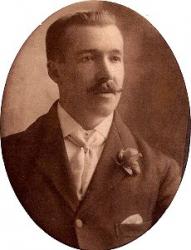1823 - 1895 Person Name: W. S. Rockstro, 1825-1895 Arranger of "OMNI DIE" in Common Praise William Rockstro (Composer, Arranger)
Born: January 5, 1823 - North Cheam, Surrey (baptisized at Modern Church), England
Died: July 2, 1895 - London, England
The English composer and writer on music, William Smith [Smyth] Rockstro (originally: Rackstraw), was distinguished as a student of modal music and an important contributor to the Grove’s Dictionary of Music and Musicians. The form of his surname by which he was known was an older style resumed after 1846. He was successively pupil of John Purkis, the blind organist, of Sterndale Bennett, and at the Leipzig Conservatorium, where he studied from I845 to 1846. He enjoyed the special friendship and tuition of Felix Mendelssohn, and was with Moritz Hauptmann for theory and with Plaidy for pianoforte.
For some years after his return to England, William Rockstro was active as a teacher and performer in London, being regular accompanist at the 'Wednesday concerts,' where Braham and other eminent singers were to be heard. At this period he wrote his most popular and beautiful song, Queen and huntress; and his pianoforte editions of classical and other operas led the way in popularising that class of music in an available form for the use of those who could not read full scores; and in his indications of the orchestral instruments above the music-staves he did much to point the way towards a general appreciation of orchestral colour. In the early 1860's he left London for Torquay on account of his mother's health and his own, and on her death in 1876 he became a Roman Catholic.
William Rockstro had been organist and honorary precentor at All Saints' Church, Babbacombe, from 1867, and won a high position as a teacher. Re published, with T. F. Ravenshaw, a Festival Psalter, adapted to the Gregorian Tones, in 1863, and Accompanying Harmonies to the Ferial Psalter in 1869. These were the first fruits of his assiduous study of ancient music, on which he became the first authority of his time in England. A couple of textbooks on harmony (1881) and counterpoint (1882) had a great success, and in the latter part of the first edition of the Grove’s Dictionary of Music and Musicians he wrote a large number of articles on musical archaeology generally. Later research has superseded his, but at the time he wrote, his contributions to such subjects as the music of the period which closed in 1600 were important. He was too ardent a partisan to be an ideal historian, but his History of Music for Young Students (1879) and his larger work, A General History of Music (1886), contain much that is of permanent value. His Life of Handel (1883) and Mendelssohn (1884) are fine examples of eulogistic biography, though they are hardly to be recommended as embodying a calmly critical estimate of either composer. In his larger History he showed that he was, nevertheless, not above owning himself in the wrong, and his recantation of certain excessive opinions expressed by him in the Dictionary against Wagner's later works was due to true moral courage. He conducted a concert of sacred music of the 16th and 17th centuries at the Inventions Exhibition of 1885, and in 1891 gave up Torquay for London, giving lectures at the Royal Academy of Music and Royal College of Music, and holding a class to counterpoint and plain-song at the latter institution. As a singing-master and teacher of the pianoforte his method of imparting instruction was remarkably successful.
As a composer, William Rockstro never quite freed himself from the powerful influences engendered by his studies: the lovely madrigal, "O too cruel fair," was judged unworthy of a prize by the Madrigal Society on the ground that it was modelled too closely on Giovanni Pierluigi da Palestrina; and his oratorio, The Good Shepherd, produced at the Gloucester Festival of 1886 under his own direction, was found to bear too many traces of Mendelssohnian influence to deserve success. In 1891 he collaborated with Canon Scott Holland in writing the life of his old friend, Jenny Lind-Goldschmidt; an abbreviated edition came out in 1863, and with Otto Goldschmidt he wrote still a shorter book, Jenny Lind, her Vocal Art and Culture (partly reprinted from the biography). For many years his health had been bad, and he had many adverse circumstances to contend with. He fought bravely for all that he held best in art, and boundless enthusiasm carried him through.
Source: Grove’s Dictionary of Music and Musicians (1952 Edition; Author: J.A. Fuller Maitland; revised: H.C. Colles)
Contributed by Aryeh Oron (July 2007)
--www.bach-cantatas.com/Lib/
W. S. Rockstro

